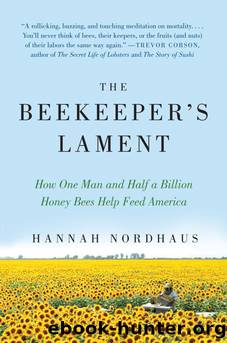The Beekeeper's Lament by Hannah Nordhaus

Author:Hannah Nordhaus [Nordhaus, Hannah]
Language: eng
Format: epub
Publisher: HarperCollins US
Published: 0101-01-01T00:00:00+00:00
Chapter Six
Charismatic Mini-Fauna
WHEN THE ALMOND BLOOM APPROACHED IN LATE 2006, BEEKEEPERS hopedâas they always doâfor a better year than the previous ones, when varroa mite had wreaked havoc across the industry. But then Colony Collapse Disorder came along, and peopleâs bees went missing, and Miller began getting lots of phone calls from journalists on the hunt for loquacious beekeepers. Before CCD, Miller received calls once or twice every year or two from some eager apiary neophyteâlike me, or a food writer for the New York Times, or a reporter from North Dakota Horizons magazineâand heâd invite us along on his native migrant tour and make us a T-shirt and wow us with his quick wit and endless enthusiasm for the wonders of bee-assisted modern agriculture.
By the spring of 2007, though, as the CCD toll mounted, Miller began getting calls more frequently, from daily newspapers and German magazines and British filmmakers and California food writers seeking to explain this new contemporary woe. Mass die-offs, apian or human, are always intriguing to those in the line of work that involves informing the publicâespecially when they may presage the end of the world or at the very least one third of our food supply, including the really good stuff like blueberries and cranberries and melons and almonds. This particular die-off was sexier yet for its inexplicability, and so the calls began coming fast and furious. A few weeks into the CCD hubbub, Miller sent me an email: âHey!â he began:
Tomorrow, NBC will be shooting and interviewing
Gene Brandi on this whole damn thing. . . .
it was supposed to be me . . .
but NOOOOOOOOOOOOOOOOOOO;
Iâm on a plane to Bismarck.
Americaâs Loss.
Stock market collapsed upon the news that my 15 min. were now yet to come another time. . . .
Gene will do extremely well.
Itâs his 15 minutes, he has to.
Brandi, a longtime fixture on the California beekeeping scene, did just fine. But Brandiâs fifteen minutes, and Millerâs, and those of all the nationâs beekeeper-sages, were nothing compared to the fifteen minutes of David Hackenberg. Heâs the Pennsylvania-based beekeeper who in November 2006 visited his hitherto healthy Florida apiaries and discovered them virtually vacant, though still containing a full complement of honey and brood. Hackenberg had been seeing some weird things for a couple of years, but he couldnât quite put a finger on what was wrong. In 2005 he had lost 40 percent of the bees he had placed in apple orchards in upstate New York: âThey swarmed out of the boxes and just flew away,â he says, leaving their honey behind. Heâd restocked those hives with new bees, but theyâd disappeared, too, and on a couple of occasions, heâd noticed bees hanging on the side of the hives but not occupying the interior. In January 2006 heâd tried again, stacking the honey boxes from the disappeared colonies on top of unaffected hives. Those colonies vanished, too.
And then, in November 2006, he pulled into a bee yard in the late afternoon, around three-thirty or four, and noticed there werenât many bees flying.
Download
This site does not store any files on its server. We only index and link to content provided by other sites. Please contact the content providers to delete copyright contents if any and email us, we'll remove relevant links or contents immediately.
| Automotive | Engineering |
| Transportation |
Whiskies Galore by Ian Buxton(41982)
Introduction to Aircraft Design (Cambridge Aerospace Series) by John P. Fielding(33113)
Small Unmanned Fixed-wing Aircraft Design by Andrew J. Keane Andras Sobester James P. Scanlan & András Sóbester & James P. Scanlan(32788)
Craft Beer for the Homebrewer by Michael Agnew(18228)
Turbulence by E. J. Noyes(8015)
The Complete Stick Figure Physics Tutorials by Allen Sarah(7361)
Kaplan MCAT General Chemistry Review by Kaplan(6922)
The Thirst by Nesbo Jo(6921)
Bad Blood by John Carreyrou(6608)
Modelling of Convective Heat and Mass Transfer in Rotating Flows by Igor V. Shevchuk(6427)
Learning SQL by Alan Beaulieu(6274)
Weapons of Math Destruction by Cathy O'Neil(6260)
Man-made Catastrophes and Risk Information Concealment by Dmitry Chernov & Didier Sornette(6001)
Digital Minimalism by Cal Newport;(5745)
Life 3.0: Being Human in the Age of Artificial Intelligence by Tegmark Max(5541)
iGen by Jean M. Twenge(5403)
Secrets of Antigravity Propulsion: Tesla, UFOs, and Classified Aerospace Technology by Ph.D. Paul A. Laviolette(5363)
Design of Trajectory Optimization Approach for Space Maneuver Vehicle Skip Entry Problems by Runqi Chai & Al Savvaris & Antonios Tsourdos & Senchun Chai(5062)
Pale Blue Dot by Carl Sagan(4993)
